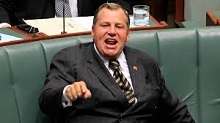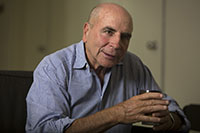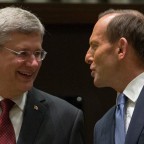1. Abbott appoints fruitcake to assist Greg Hunt

He says he’s not a denier or a sceptic, so let’s just call him a fruitcake. In the recent ministerial reshuffle Bob Baldwin has been moved from Parliamentary Secretary to the Minister for Industry to Parliamentary Secretary to the Environment Minister.
Baldwin told the Chinese that the climate had been changing for millions of years and we wouldn’t have coal, oil or gas without climate change. That’s a typical denialist tack. Elsewhere he quoted that well-known authority on everything, Queensland radio shock-jock Michael Smith. If the atmosphere was a bridge a kilometre long, he said, the first 770 metres would be nitrogen, the next 210 metres oxygen, and so on until you come to CO2. Australia’s contribution of CO2 is the equivalent to 0.18 millimetres, the width of a human hair.
2. Bernie Fraser sends a Christmas message to Abbott

Basically, keep the Renewable Energy Target (RET), it all you’ve got, and the Emissions Reduction Fund (ERF) may not meet its initial target of 5% emissions reductions by 2020. In any case it is not scalable to meet the targets we are likely to be committed to post 2020.
The Climate Change Authority has just completed its review of the RET and a review of the Carbon Farming Initiative (CFI), as mandated in the establishing legislation. I’d recommend reading Bernie’s Chairman’s Statement.
The CCA recommends extending the achievement date of the RET by up to three years, but this is the big picture:
The Authority has argued consistently throughout its short life that an effective policy response to the risks of climate change requires favourable winds on at least two fronts:
• first, a broad community consensus that climate change poses real risks to the community; and
• secondly, a well-stocked toolbox to be able to tap into opportunities to reduce emissions wherever they occur.
Neither exists today. The earlier broad political consensus has ruptured in recent years, and no early repair is in prospect. And the tool box is feeling less weighty, with the removal of the carbon pricing mechanism, an unproven ERF, and an uncertain outlook for the RET.
There’s more from Giles Parkinson who calls it “a damming assessment of Abbott government climate policy” and from Sophie Vorrath.
3. Harper flags carbon price rethink for Canada

Before Christmas when Tony Abbott was asked what he’d achieved as Minister for Women he nominated dumping the carbon tax. At the same time the Canadian PM Stephen Harper, Abbott’s soul-mate on climate policy, suggested that he was open to a country-wide carbon pricing scheme similar to the one implemented in Alberta.
In Alberta, energy heavy polluting companies are required to reduce their energy intensity, or improve their energy efficiency, annually. If they don’t, they must contribute to a technology fund at $15 a tonne for carbon emissions.
“I think it’s a model on which you could, on which you could go broader,” Harper said in Wednesday’s interview.
Tesla is opening a battery swap station between Los Angeles and San Francisco on a pilot basis to see whether the idea goes anywhere. Zachary Shahan, the author of the linked piece, suggests perhaps not. The swap must be done by appointment and although it may be completed in less than a minute it would cost almost as much as a tank of premium. The alternative is free Supercharging for Tesla owners.
5. Technology on the move
In the same issue of RenewEconomy as the Tesla battery swap item above were three other technology announcements.
First, the ASX listed company Algae.Tec has issued rights to raise capital to build an algae biofuel plant in India.
Second, the ADF is looking to replace diesel generation with renewable energy to power Bathurst Island, north of Darwin, probably wind and solar.
Third, a solar plant that floats on water is being launched in South Korea.
6. Banks begin to take climate risk seriously
The large investor Australian Super has been asking banks about their climate change risk policies. It sounds as though banks are pretending to be more active than they really are, but it is clear that the investment landscape has changed forever. If the banks have not been actively concerned, they soon will.
Former Coalition opposition leader John Hewson, who chairs the Asset Owners Disclosure Project
is considering “naming and shaming” how the world’s 1000 biggest banks are responding to carbon risk, something it already does for pension funds.


And Australian Super investments ?
They’re not the only ones…
Here is a very interesting article on carbon foot print, suburbia, EV’s and solar, which backs up everything that we all have been commenting here.
http://www.washingtonpost.com/blogs/wonkblog/wp/2014/12/24/how-solar-power-and-electric-cars-could-make-suburban-living-awesome-again/
Some info on those Tesla Supa Chargers. From my business partner’s last Europe trip during which he drove a Tesla S all around Germany and used the free chargers. Apparently they charge at a rate up to 100 kilowatts which packs in a lot of charge in just 20 minutes.
Bilb @2: The other key change is the move to working at or close to home. Makes living away from the CBD a lot more attractive. My guess is that most people would prefer the close option because working at home, in my experience cuts you off from the social benefits of work.
Working close also stimulates the need for office space, eateries etc. which makes suburban living more tolerable.
Compressed air ” batteries ” would have to be the cleanest form of storage and as such the ultimate goal for environmentalists.
Things are happening,
http://fortune.com/2014/12/31/danielle-fong-lightsail-energy/
or
http://techxplore.com/news/2014-09-peugeot-hybrid-compressed-air-car-paris.html
or
http://blog.caranddriver.com/so-funky-so-french-wild-citroen-c4-cactus-airflow-2l-uses-compressed-air-hybrid-powertrain-to-achieve-118-mpg/